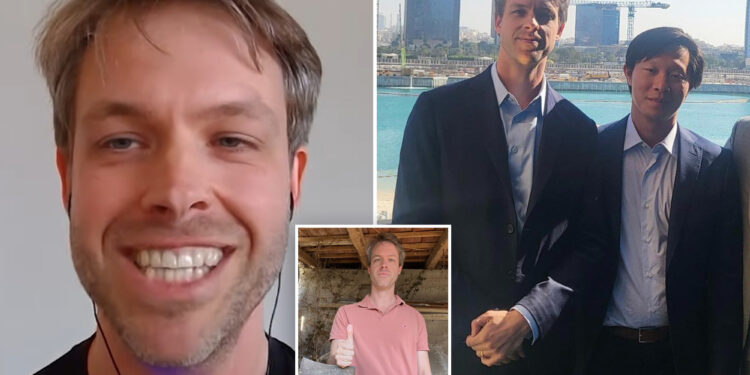
A co-founder of a failed cryptocurrency hedge fund who lost $3.5 billion in investor cash grinned as he showed no remorse for losing the funds — as he remains on the run in an unknown location.
Kyle Davies, the co-founder of the bankrupted crypto hedge fund Three Arrows Capital (3AC), appeared on the Unchained podcast Tuesday, claiming he’s not sorry for losing his investor’s money since “every company goes bankrupt.”
“Am I sorry for a company going bankrupt? No. Like companies go bankrupt, almost every company goes bankrupt, right?” Davies brazenly told host Laura Shin.
“It’s how you build or what you do about it. We’re definitely trying our best. We can add value in various ways. At a minimum, we can even tell the next Three Arrows how to do things better when they go bankrupt.”
Davies and his partner Su Zhu founded 3AC in 2012 and, over time, secured billions from investors as cryptocurrencies began to capture the interests of millions around the globe.
The Singapore-based hedge fund managed around $18 billion in crypto assets at its peak.
However, 3AC saw heavy losses after the crypto market downturn in mid-2022 and for making large trades in coins like LUNA and Terra that failed to pan out, according to Capital.com.
The company then went bankrupt, and it was revealed that the hedge fund had borrowed money from over 20 institutions and that the firm owed billions to its investors.
3AC was first ordered to liquidate by a court in the British Virgin Islands, followed by courts in Singapore and the US, to repay its investors.
However, both Davies and Zhu fled and went on the run.
Zhu was arrested at Changi Airport in Singapore in September and sentenced to four months in prison for failing to coordinate with liquidators, but Davies has managed to avoid capture.
Davies said their sentencing was a “surprise” to both him and Zhu. Following his partner’s arrest, it was revealed they had missed a court date.
“Obviously, if we had intended not to go to the court date, you just wouldn’t be in Singapore, right? But Zhu was in Singapore,” Davies said.
“Given that there was a court date, you would go. Otherwise, you’d be in contempt of court.”
Davies, who is wanted in Singapore and faces the same sentence as his partner, said he has no plans to return to the country “immediately” but would consider it if the contempt order was dropped.
“Obviously, these things just resolve at some point, there are settlements,” he said. “These are common kinds of tactics, so I’ve learned… at the end of the day, all these things resolve.”
When Shin asked if he had fired his lawyers because they allegedly were not informed about the court date, Davies said, “Maybe we should.”
Davies’ location is still a mystery, though it’s speculated he may be hiding out in Portugal.
He gained citizenship in Singapore after he renounced his US citizenship, according to CoinDesk.
In an interview with New York Magazine in February, he claimed to be “in Europe” but did not confirm whether he was staying in Portugal.
Shin then asked Davies if he was allowed to return to the US to see his family. He said he had no reason to believe he would face repercussions for doing so but has not.
Davies also spoke about the fall of his startup OPNX, which he launched in Dubi in April 2023.
Dubai’s crypto regulator formally reprimanded OPNX for operating an unregulated exchange months after its launch. The exchange was shut down in February, according to Coindesk.
The failure of 3AC and OPNX came around the same time as the fall of their notable competitors, FTX and Binance.
Sam Bankman-Fried, the founder of FTX, has been convicted of one of the largest financial frauds in history in 2023. He faces 40 to 50 years behind bars at his sentencing on March 28.
Similarly, Changpeng Zhao was forced to step down as CEO of Binance after he pleaded guilty to anti-money laundering violations in November. His sentencing is scheduled for April 30.
Before Bankman-Fried’s arrest, he blamed most of the 2022 crypto collapse directly on Davies and Zhu’s company 3AC.
“I suspect they might be 80 percent of the total original contagion,” the disgraced crypto trader told New York Magazine in 2022.
“They weren’t the only people who blew out, but they did it way bigger than anyone else did. And they had way more trust from the ecosystem prior to that.”



























